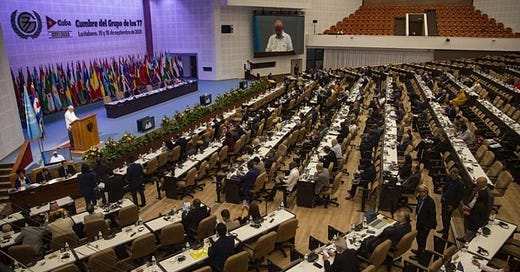A Summit of the Group of 77 plus China was held in Havana on September 15 and 16, 2023, with the slogan “Current Development Challenges: The role of science, technology and innovation.” There were more than 1,300 participants in the Summit, representing 116 countries and twelve UN organizations and agencies, including thirty-three countries of Latin America and the Caribbean, forty-six from Africa, and thirty-four from Asia and Europe.
At the Summit, as is typical of international meetings involving representatives of governments of the Global South, there existed the political freedom to express opposition to the reigning unjust international order and to propose alternative concepts and concrete measures integral to the construction of an alternative world order, in which the countries of the South are freed from current structural constraints. As Venezuelan President Nicolás Ma…



